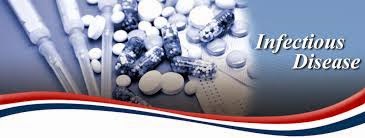An infectious disease is any disease caused by a pathogen (germ) such as a virus, bacteria, parasite, or fungus. Other living organisms such as animals, plants, and microorganisms can all be made ill by an infectious disease.
Pathogens
“Pathogen” is the scientific name for “germ.” Infectious diseases are caused by pathogens. When your mom says to wash your hands because of germs, she wants you to get all the pathogens off your hands so they won’t go into your mouth and body. Pathogens are tiny organisms (called microorganisms) that invade the body and make it
sick. Different kinds of pathogens cause different kinds of diseases. Here are some diseases caused by each type of pathogen:
- Viruses – Viruses are extremely small and consist of DNA with a protective coating of protein. Diseases caused by viruses include influenza, the common cold, measles, yellow fever, and hepatitis.
- Bacteria – Bacteria are small microorganisms. They can cause diseases such as tuberculosis, cholera, typhoid fever, and tetanus.
- Parasites – Parasites are organisms that live off their hosts. Some parasitic diseases include malaria, sleeping sickness, and scabies.
- Fungi – Fungi are microorganisms such as yeasts and molds. They can cause diseases such as fungal meningitis, ringworm, and thrush.
Must Read: deadly Coronavirus
Transmission
Infectious diseases can be transmitted in several ways including:
- Food and water contamination – Some diseases are passed on by contaminated food or water. This can occur in undercooked food or when sewage gets into the water supply. Examples of diseases that are transmitted this way include E. coli, cholera, and salmonella.
- Insect bites – Insects such as fleas, mosquitoes, and ticks can carry pathogens that get passed on when they make contact with humans. Diseases from insects include malaria (mosquitoes), Lyme disease (ticks), and the bubonic plague (fleas).
- Direct contact – Diseases are often passed from person to person by direct contact. This could include shaking hands, sneezing (airborne), and kissing. Examples include influenza, the common cold, and chickenpox.
- Indirect contact – Some pathogens can survive for a while outside the host. They may be on objects such as doorknobs and telephones. Many of the same diseases, but not all, that can spread through direct contact can also be spread through indirect contact.
Other Types of Diseases
Not all diseases are infectious diseases. Some other types of diseases include:
- Autoimmune – An autoimmune disease occurs when the immune system attacks the body. Examples include Type I diabetes and multiple sclerosis.
- Lifestyle – Lifestyle diseases are caused by the way people live. They can also be a result of people living longer. Examples include Type 2 diabetes, alcoholism, and Alzheimer’s disease.
- Disorder – A disease is sometimes called a disorder when some part of the body isn’t functioning normally. Often disorders are associated with the brain and are called mental disorders. Examples include eating disorders such as bulimia and mental disorders such as depression.
- Heart disease – Heart disease is used to describe anything that is wrong with the cardiovascular system. This includes diseases such as coronary artery disease, high blood pressure, and congenital heart disease.
- Medical condition – The term medical condition is used to describe everything from injuries to infectious diseases to disorders. An injury such as a concussion would be considered a medical condition.
Also, Read: Cancer : A Fatal Disease in India
Interesting Facts about Infectious Disease
- A Zoonotic disease is an infectious disease that can be transmitted between animals to humans.
- Not all infections are considered diseases as some infections don’t make a person sick.
- Not all viruses, bacteria, parasites, and fungi are bad for humans, but the ones that do cause disease are called pathogens.
- Over 160,000 people die each year in the United States from infectious diseases.
- A “contagious” disease is an infectious disease that is very easily transmitted.
Don’t Miss:
Chickenpox and Shingles Diseases Caused by Virus Varicella zoster


